Title search results
Showing 1 - 6 of 6 items
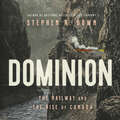
Dominion: The Railway and the Rise of Canada
By Stephen Bown. 2023
Stephen R. Bown continues to revitalize Canadian history with this thrilling account of the engineering triumph that created a nation.In…
The Company, his bestselling work of revisionist history, Stephen Bown told the dramatic, adventurous and bloody tale of Canada's origins in the fur trade. With Dominion he continues the nation's creation story with an equally gripping and eye-opening account of the building of the Canadian Pacific Railway.In the late 19th century, demand for fur was in sharp decline. This could have spelled economic disaster for the venerable Hudson's Bay Company. But an idea emerged in political and business circles in Ottawa and Montreal to connect the disparate British colonies into a single entity that would stretch from the Atlantic to the Pacific. With over 3,000 kilometers of track, much of it driven through wildly inhospitable terrain, the CPR would be the longest railway in the world and the most difficult to build. Its construction was the defining event of its era and a catalyst for powerful global forces.The times were marked by greed, hubris, blatant empire building, oppression, corruption and theft. They were good for some, hard for most, disastrous for others. The CPR enabled a new country, but it came at a terrible price.In recent years Canadian history has been given a rude awakening from the comforts of its myths. In Dominion, Stephen Bown again widens our view of the past to include the adventures and hardships of explorers and surveyors, the resistance of Indigenous peoples, and the terrific and horrific work of many thousands of labourers. His vivid portrayal of the powerful forces that were molding the world in the late 19th century provides a revelatory new picture of modern Canada's creation as an independent state.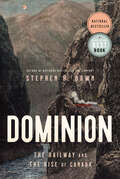
Dominion: The Railway and the Rise of Canada
By Stephen Bown. 2023
A thrilling new account of the engineering triumph that created a nationIn The Company, his bestselling work of revisionist history,…
Stephen R. Bown told the dramatic, adventurous and bloody tale of Canada's origins in the fur trade. With Dominion he continues the nation's creation story with an equally gripping and eye-opening account of the building of the Canadian Pacific Railway.In the late 19th century, demand for fur was in sharp decline. This could have spelled economic disaster for the venerable Hudson's Bay Company. But an idea emerged in political and business circles in Ottawa and Montreal to connect the disparate British colonies into a single entity that would stretch from the Atlantic to the Pacific. With over 3,000 kilometres of track, much of it driven through wildly inhospitable terrain, the CPR would be the longest railway in the world and the most difficult to build. Its construction was the defining event of its era and a catalyst for powerful global forces.The times were marked by greed, hubris, blatant empire building, oppression, corruption and theft. They were good for some, hard for most, disastrous for others. The CPR enabled a new country, but it came at a terrible price.Stephen R. Bown again widens our view of the past to include the adventures and hardships of explorers and surveyors, the resistance of Indigenous peoples, and the terrific and horrific work of many thousands of labourers. His vivid portrayal of the powerful forces that were moulding the world in the late 19th century provides a revelatory new picture of modern Canada's creation as an independent state.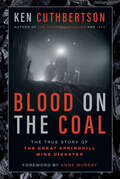
Blood on the Coal: The True Story of the Great Springhill Mine Disaster
By Ken Cuthbertson. 2023
The riveting true story of one of Canada’s worst mining disasters, told in the voices of the men who survived…
itThey said it was the world’s deepest and most dangerous coal mine. Those who made that claim were probably correct. What is certain is that in October 1958, the Dominion Steel and Coal Corporation’s No. 2 colliery at Springhill, Nova Scotia, was a leading candidate for both those dubious distinctions. The mine was the proverbial “disaster waiting to happen.” And it did. Springhill was the quintessential one-industry town, whose existence depended on coal, a commodity with a dying market. And yet something far worse was soon to come. On the night of October 23, 1958, a “bump” in the mine—actually a small earthquake—shook the ground beneath the town. Seventy-five miners died and scores more were injured in what remains one of Canada’s worst underground disasters. The lives of the survivors were shattered, and Springhill would never be the same again. In compelling detail, Ken Cuthbertson tells the stories of three of the miners and one of the doctors who cared for them following the disaster. This remarkable book is based on historical documents and interviews, as well as new interviews with the last of the surviving miners and their loved ones. It is a story of heroism, sacrifice and the indomitable strength of the human spirit.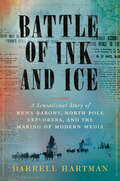
"Absolutely gripping… a perfectly splendid read—I highly, highly recommend it&” -- Douglas Preston, author of the #1 New York Times…
bestseller The Lost City of the Monkey GodA sixty-year saga of frostbite and fake news that follows the no-holds-barred battle between two legendary explorers to reach the North Pole, and the newspapers which stopped at nothing to get–and sell–the story.In the fall of 1909, a pair of bitter contests captured the world&’s attention. The American explorers Robert Peary and Frederick Cook both claimed to have discovered the North Pole, sparking a vicious feud that was unprecedented in international scientific and geographic circles. At the same time, the rivalry between two powerful New York City newspapers—the storied Herald and the ascendant Times—fanned the flames of the so-called polar controversy, as each paper financially and reputationally committed itself to an opposing explorer and fought desperately to defend him.The Herald was owned and edited by James Gordon Bennett, Jr., an eccentric playboy whose nose for news was matched only by his appetite for debauchery and champagne. The Times was published by Adolph Ochs, son of Jewish immigrants, who&’d improbably rescued the paper from extinction and turned it into an emerging powerhouse. The battle between Cook and Peary would have enormous consequences for both newspapers, and help to determine the future of corporate media. BATTLE OF INK AND ICE presents a frank portrayal of Arctic explorers, brave men who both inspired and deceived the public. It also sketches a vivid portrait of the newspapers that funded, promoted, narrated, and often distorted their exploits. It recounts a sixty-year saga of frostbite and fake news, one that culminates with an unjustly overlooked chapter in the origin story of the modern New York Times.By turns tragic and absurd, BATTLE OF INK AND ICE brims with contemporary relevance, touching as it does on themes of class, celebrity, the ever-quickening news cycle, and the benefits and pitfalls of an increasingly interconnected world. Above all, perhaps, its cast of characters testifies—colorfully and compellingly—to the ongoing role of personality and publicity in American cultural life as the Gilded Age gave way to the twentieth century—the American century.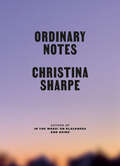
Ordinary Notes
By Christina Sharpe. 2023
One of The Millions&’ &“Most Anticipated Books of 2023One of The New York Times&’ &“19 Works of Nonfiction to Read…
This Spring&”A dazzlingly inventive, deeply moving, intellectually bracing exploration of pain and beauty, private memory and public monument, art and complexity in contemporary Black life.&“I wanted to write about silences and terror and acts that hover over generations, over centuries. I began by writing about my mother and grandmother.&” —from &“Note 18&” in Ordinary NotesA singular achievement, Ordinary Notes explores with immense care profound questions about loss, and the shapes of Black life that emerge in the wake. In a series of 248 brief and urgent notes that gather meaning as we read them, Christina Sharpe skillfully weaves artifacts from the past—public ones alongside others that are poignantly personal—with present-day realities and possible futures, intricately constructing an immersive portrait of everyday Black existence. Through the striking images and words in these pages, themes and tones echo: sometimes about life, art, language, beauty, memory; sometimes about history, photography, and literature—but always attending, with exquisite care, to the ordinary-extraordinary dimensions of Black life. At the heart of Ordinary Notes is the indelible presence of the author&’s mother, Ida Wright Sharpe. &“I learned to see in my mother&’s house,&” writes Sharpe. &“I learned how not to see in my mother&’s house . . . My mother gifted me a love of beauty, a love of words.&” Using these and other gifts and ways of seeing, Sharpe steadily summons a chorus of voices and experiences to become present on the page. She articulates and follows an aesthetic of "beauty as a method,&” collects entries from a community of thinkers towards a &“Dictionary of Untranslatable Blackness,&” and rigorously examines sites of memory and memorial. And in the process, she forges a new literary form, as multivalent as the ways of Black being it traces.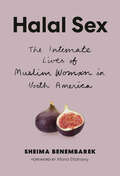
Halal Sex: The Intimate Lives of Muslim Women in North America
By Sheima Benembarek. 2023
An unprecedented glimpse into the sex lives of female and gender-expansive Muslims living across Canada and the United States.In the…
Muslim world, sex is permissible (or halal) only within the confines of marriage. Outside of wedlock, the act is considered haram, a sin of the faith. Girls are taught to protect their virginity; their mothers, if not forgoing &“the talk&” altogether, obscure the facts with elliptical language and metaphors.So, what happens when immigrants and the children of immigrants set about pursuing an open and active sex life on a more sexually liberated continent, amid western peers and attitudes? The six deeply personal stories in Halal Sex attempt to answer this question, bringing a hushed conversation out into the open.Within these pages you&’ll meet Azar, a non-binary trans Sufi; Bunmi, a Nigerian navigating shame and Tinder; Eman, a lesbian stand-up comic in an interfaith marriage; Taslim, a virgin in her forties struggling to erect healthy boundaries; and Khadijah, an exotic dancer and sex worker.With great empathy, Sheima Benembarek makes space for the honesty and vulnerability of each participant and handles their stories with gentleness and care. What emerges is a tapestry of a diverse Islam—encompassing a wide variety of cultural and religious and socioeconomic backgrounds—and a frank, feminist contribution to the advancement of Muslim sexual education and pleasure.